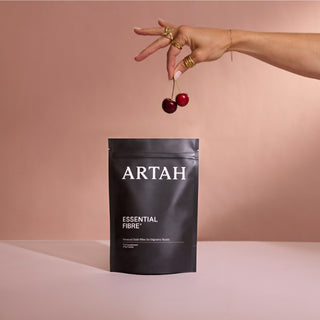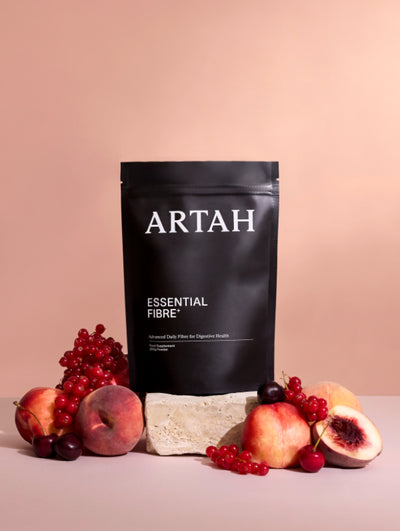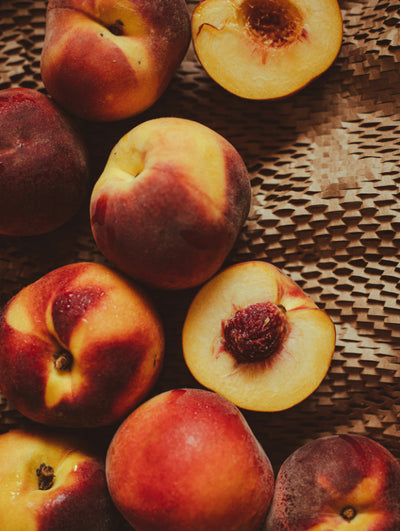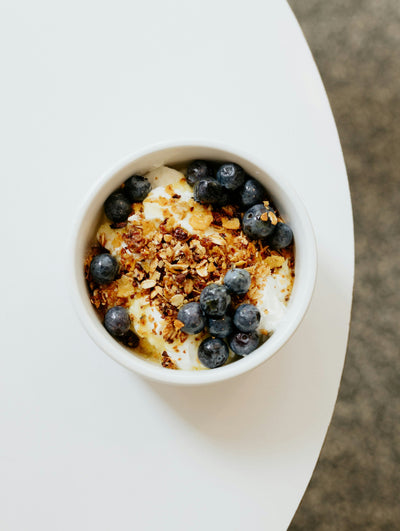Our Head of Nutrition April Morgan gives her view.
As a practitioner, I’ve been able to observe the distinct patterns that people follow throughout the year when it comes to their health. Whilst the media tends to focus on weight loss come the new year, in my experience, January is the worst month for gut health and is a time when I am inundated with requests for support with bloating, bowel sluggishness, poor digestion and more. Of course, there are numerous things that go hand in hand with a disruption in gut health, like weight gain, skin issues, low mood and less immune resilience, but the flare up in gut symptoms is distinctive. When you zoom out, it makes perfect sense. The holiday indulgence season seems to get longer each year, and with it brings an increase in alcohol, lots of inflammatory foods, and a preference for constant grazing over healthful meals. And that’s just the nutrition part. We also tend to sleep less, stress more, and move less, which together, provides the perfect storm for gut health.
I struggled with gut issues from a very young age – with bloating being my number one (and most hated) symptom – so I know that there's a delicate balance between certain foods and lifestyle factors and being mindful of this is key to keeping everything feeling good. Great gut health comes from everyday care and consistency, and implementing some non-negotiables can make all the difference. That being said, it’s also important to have some recovery practices up your sleeve so that you can keep yourself in check when things go out of balance. The first two things I recommend you do are reduce ‘inflammatory’ foods and increase time between meals. Here’s why.
Inflammatory foods can have a significant impact on the gut, affecting its health, function, and balance. The gut is home to trillions of bacteria that play a critical role in digestion, immunity, and mood regulation. When we consume inflammatory foods, they can disrupt this delicate ecosystem and lead to a variety of issues.
How do inflammatory foods affect the gut:
- Disrupt the microbiome by altering its composition; think more harmful bacteria, less beneficial bacteria. This imbalance is called dysbiosis and can contribute to symptoms like bloating, constipation, flatulence, diarrhoea and burping.
- Increase its permeability (a.k.a Leaky Gut); this happens when the tight junctions between the cells that line the gut expand, allowing particles like undigested food and toxins to enter the bloodstream. This can trigger an immune response, leading to inflammation throughout the body which impairs nutrient absorption, energy and mood regulation.
- Alter its motility; inflammatory foods may affect the way the muscles of the intestines contract and move food through the digestive system. This can lead to either slower gut motility (constipation) or faster gut motility (diarrhea). This alteration is due to the impact of inflammation on the enteric nervous system, which controls gastrointestinal function. The consumption of certain foods, like highly processed and sugary foods, can exacerbate conditions like IBS.
Why is this important?
-
Allows Time for Digestion; when we eat, our body starts a complex process to break down food, absorb nutrients, and eliminate waste. If you eat too frequently, the digestive system doesn't have enough time to fully process the previous meal, which can lead to discomfort, bloating, or indigestion. By allowing your digestive system to fully break down and absorb nutrients before introducing more food, it helps to maximise nutrient uptake.
-
Supports the Migrating Motor Complex (MMC); The MMC is a cycle of electrical and mechanical activity in the digestive tract that occurs between meals. Its primary role is to clear undigested food particles, bacteria, and other waste from the stomach and small intestine. Gaps between meals allow this process to occur efficiently, promoting gut cleanliness and reducing the risk of bacterial overgrowth. Without enough time between meals, the MMC can be impaired, which can lead to bloating, discomfort, and an increased risk of conditions like Small Intestinal Bacterial Overgrowth (SIBO).
-
Promotes Gut Lining Repair; periods without food allow the cells lining in our gut to repair and regenerate. When we're constantly eating, the cells are always engaged in digestion and absorption, leaving less time for repair and regeneration. This could compromise the integrity of the gut lining, increasing the risk of leaky gut, which can trigger inflammation and immune system imbalances.
So, here’s what I do to ‘heal’ my gut after overdoing it.
-
Step 1: First and foremost, remove foods that can contribute to inflammation, like alcohol, added sugar, conventional dairy, excess gluten, excessive caffeine. It is best to do this for a targeted amount of time, but I would give yourself 4 weeks, depending on the severity of your symptoms.
-
Step 2: Replace with an abundance of vegetables, fruit, good fats, lean protein, naturally gluten free complex carbohydrates and plenty of hydration through water and herbal tea. This ensures we flood the body with fibre, polyphenols and micronutrients to support inflammation levels and feed the microbiome. If you’re feeling extra sluggish in your digestion, try to over-index on cooked veggies rather than raw, which can be more challenging to digest.
-
Step 3: Supplement to support microbial balance. My personal favourite from our collection is G.I Cleanse, which is an unbelievable formula for this type of situation. On a personal note, I recently took this for 3 months due to an unusual flare up of dermatitis on my face (as you guys know, good skin always starts from the gut). I was amazed how effective it was. Not only did it improve my skin, it gave me an incredible glow and my bowel movements were full, well formed, I had no bloating and my digestion improved massively. I usually rely on digestive bitters and enzymes due to my pancreas being a bit lazy but felt there was no need for this. Hands down my favourite ARTAH product and maybe even my favourite product ever!
-
Step 4: Repopulate the gut with live bacteria using both fermented food sources such as kimchi, sauerkraut, kefir yoghurt and fermented soy products. If you feel you need extra support, I would pair this food-first approach with Biome Restore or Enhanced Synbiotic, depending on whether you need extra strength or general support.


















































